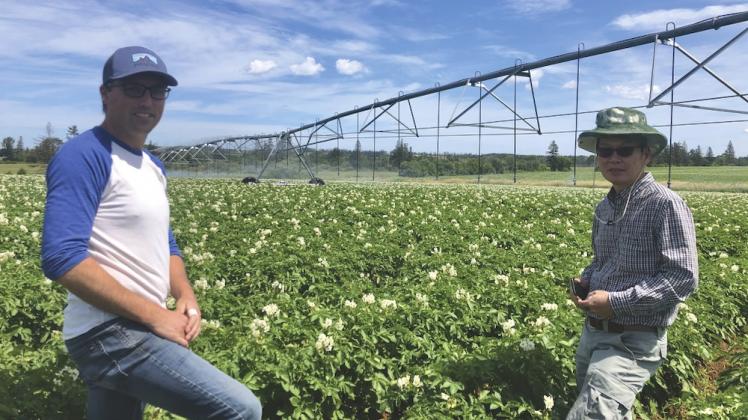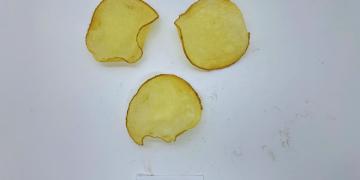Canada: First Living Lab focused on potatoes
Federal funding program helped look at cover crop effects and reducing tillage in potatoes.

The first Living Lab – Atlantic program was heavily focused on potato research and has led to an increase in the integration of cover crops into potato growing areas in Prince Edward Island.
The Living Lab was led by the East Prince Agri-Environment Association (EPAA), with the involvement of the Prince Edward Island (PEI) Potato Board and 13 other partner organizations. For Ryan Barrett, it was the chance to exchange perspectives and directly address erosion and water quality issues.
For the last decade, growers, researchers and organizations like the EPAA have tested and implemented practices to enhance ground cover (minimizing the time the soil is left bare), reduce tillage intensity and apply organic amendments and supplemental irrigation and reduce nitrate loading into receiving water courses.
“It’s been a valuable way to investigate ‘win-win’ practices that provide short-term and long-term value to the producer but also provide environmental benefits, as well,” says Barrett, research and agronomy specialist with the PEI Potato Board. “At the same time, we’ve been able to do research on a plot scale but also at the farm level, bringing growers into the research loop and allowing them to see first-hand how some of these BMPs could work on their farms.”
In Living Lab – Atlantic, the PEI Potato Board led trials on fall-seeded and full-season cover crops. With fall-seeded cover crops – planted the year before potatoes – they showed a clear trend towards higher marketable yields (approximately 10 per cent increase) versus no cover crop. They were also able to demonstrate environmental benefits such as increases in nitrate uptake in the cover crop and a reduced risk of soil erosion.
“In our project on the use of cover crops after potatoes, we were able to demonstrate that higher seeding rates didn’t necessarily improve cover crop stands, which is important from an economic standpoint,” says Barrett. “We also demonstrated which cover crop species performed better depending on the lateness of planting and how this related to erosion reduction and nitrate uptake.”
He adds that some projects were more successful than others – but that’s the nature of research. What’s encouraging is that from the Living Lab – Atlantic initiative, there’s been a noticeable increase in the level of fall cover cropping in potato rotations.
A recent PEI Potato Board survey indicated nearly half of Island potato acres are now cover cropped before potatoes, which is a significant increase compared to five years ago. Barrett notes there are other projects that are carrying on with other research trials, including nutrient use, optimizing fertilizer and attempt- ing to quantify the nitrogen credit from legumes (alfalfa or red clover) before potatoes.
Evolving practices and technologies
Living Lab – Atlantic’s research into erosion and water quality was equally important to the EPAA. Andrea McKenna, the association’s executive director, says the need to appreciate the nature of PEI soils which are generally described as fine sandy-loam that are highly susceptible to erosion. The use of wetlands, bioreactors and vegetated waterways were included as part of the Living Lab project.
“Research on water quality has been important in a number ways, from vegetation in and around buffer zones using up excess nutrients and filtering out excess sediment prior to it entering water courses,” she says. “We also used construction of vegetated waterways and living berms to manage water flow and minimize negative impacts. This all contributes to enhancing soil health.”
It helped spur subsequent trials into slow-release nitrogen and enhanced-efficiency fertilizer products, meaning in an increase in their adoption. Increased adoption came with support of a cost- share program through the federal Agricultural Climate Solutions – On-Farm Climate Action Fund (OFCAF), delivered by the PEI Federation of Agriculture.
“Super U is a urea-based nitrogen fertilizer that can be applied to the soil at or near planting,” says McKenna. A trial was carried out by Steve Watts from Genesis Crop Systems and six PEI farmers, to test this product to reduce greenhouse gas emissions. Results showed a 30 per cent reduction in greenhouse gas emissions and around a 15 per cent decline in fertilizer per acre with Super U applications. There were no impacts on yield and fertilizer costs stayed the same.
What’s next?
In response to the growing interest in irrigation in PEI, researchers from Living Lab – Atlantic conducted on-farm trials in four to five fields annually from 2019 to 2022. Among the parameters they investigated were the effects of supplemental irrigation (SI) and fertilizer reduction on potato yield and the potential for nitrate leaching.
“Research found that SI increased tuber yield in a very dry season like 2020 or in a year with uneven rainfall distribution – like 2019,” says Dr. Yefang Jiang, one of AAFC’s researchers on the Living Lab project.
Fuente: https://www.manitobacooperator.ca/crops/first-living-lab-focused-on-potatoes/




